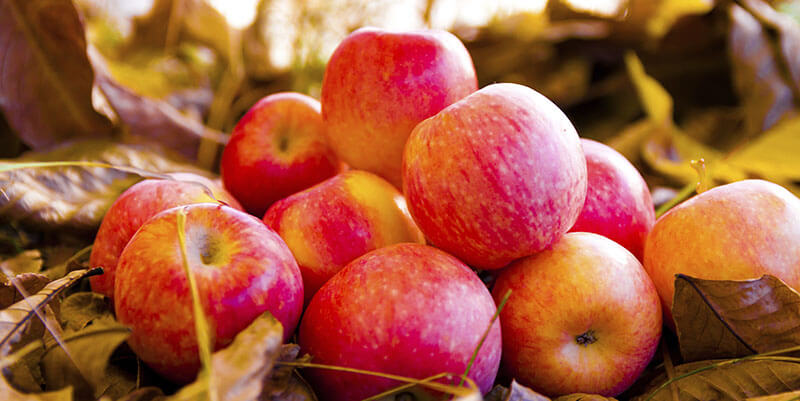
Apple picking season is upon us! Apples are a fall favorite and a key ingredient of so many delicious fall recipes. What is it that makes apples so good for us and is there any truth to that old saying, "an apple a day keeps the doctor away?" The proof is in the pudding, or in this case, the apple sauce.
The proverb "an apple a day keeps the doctor away" can be traced back to at least February of 1866 when it appeared in print for the first time in Notes and Queries magazine. The original proverb read a little bit differently: "Eat an apple on going to bed, and you'll keep the doctor from earning his bread." There is also confusion as to whether the proverb is literally referring to apples or is referring to all fruit since in Old English, an apple referred to all round fruit that grew from a tree. For the sake of this article, we will assume they really meant apples!
So what makes apples so good for us? For starters, they are very high in the soluble fiber Pectin which can lower blood pressure, glucose levels, and bad cholesterol. High fiber foods help to maintain the health of the digestive system. They are also low in calories, between 70-100 calories for a normal sized apple, and since they are about 85% water by weight, they will fill you up even though they don't have many calories. Apples are also very high in vitamin C and are a good source of potassium. Another nutrient found in apples is Boron, which helps strengthen bones and keep the brain healthy. Research shows that apples are also good for improving lung function and lowering risk of asthma in adults and risk of developing COPD in smokers. Eating a fresh apple will clean your teeth and kill bacteria in the mouth preventing tooth decay while keeping the dentist away!
Apples also contain an abundance of phytonutrients such as vitamin A, vitamin E, and beta carotene, as well as the flavonoid quercetin. Phytonutrients and flavonoids act as antioxidants which protect the body from damage caused by free radicals within the cells. Free radicals are molecules that have an unpaired electron on their outer shell. They are very unstable and cause damage as they react with other molecules to try and steal an electron. A study from Cornell University showed the naturally occurring antioxidants in apples, primarily quercetin, have stronger anti-oxidant protective effects than vitamin C, and may help reduce the risk of neurodegenerative conditions. Other studies have associated antioxidants, or phytochemicals, with reduced risk of cancer, heart disease, and diabetes as well as bacterial and viral infections. Phytochemicals are also anti-allergenic and anti-inflammatory. The results of this study seem pretty conclusive, an apple a day does keep the doctor away.
The results of the Cornell study seem to fly in the face of a joint study done by groups from Dartmouth College, the University of Michigan, and the VA Medical Center in White River, Vermont. The study set out to examine the relationship between eating an apple a day and keeping the doctor away by comparing the average number of doctor visits per year by individuals who consumed apples on a daily basis versus those who did not consume apples on a regular basis. While the results did show the apple eaters had slightly less doctor visits than non apple eaters, the number was not statistically significant when adjusted for sociodemographic and health related characteristics. The study did, however, prove an apple a day keeps the pharmacist away by showing apple eaters do not take as much prescription medication as their counterparts. The study also showed no difference in overnight hospital stays and mental health visits.
So does an apple a day really keep the doctor away? It seems it would depend on that doctor's specialty. It could keep the allergist away, unless you were being seen for an apple allergy, in which case an apple a day would not be recommended. While an apple a day won't keep all doctors away, science has proven an apple a day will keep the pharmacist, dentist, cardiologist, endocrinologist, oncologist, hematologist, urologist, neurologist, and gastroenterologist away, although that doesn't quite have the same ring to it, does it?
